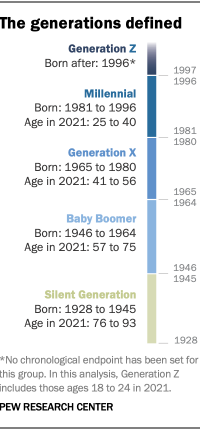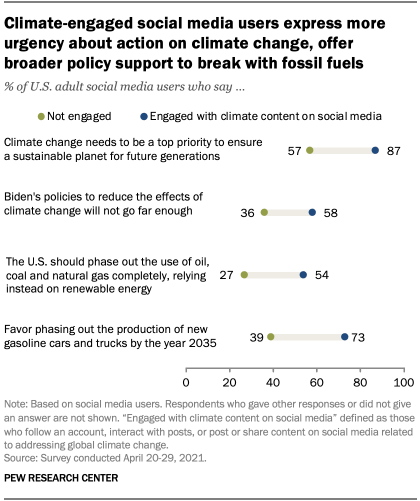A new Pew Research Center study finds that Gen Z and millennial social media users are more likely than older generations to engage with climate change content on social media, and when they see climate-related content, they’re more likely to express a range of emotions, from fear for the future to anger that not enough is being done.
In the effort to stop climate change, environmental activists Greta Thunberg and Sunrise Movement Among those working to solve this problem.
Among U.S. social media users, 45% of Gen Z adults and 40% of Millennials have engaged with content on social platforms focused on the need to address climate change by following accounts, liking or commenting on posts, or posting or sharing content about the need to address climate change. In contrast, Gen X (27%) and Baby Boomer+ social media users (21%) are much less likely to have engaged with climate change content in any of these ways.
Pew Research Center conducted the survey to understand how Americans view climate, energy and environmental issues. It surveyed 13,749 American adults from April 20-29, 2021.
The survey was conducted by Pew Research Center’s American Trends Panel (ATP) and also included an oversample of adults ages 18 to 24 from the Ipsos Knowledge Panel. The sample included 912 Gen Z adults born after 1996.
Respondents for both panels are recruited through a nationwide random sampling of residential addresses, which provides an opportunity for nearly all U.S. adults to be represented. The surveys are weighted to be representative of the U.S. adult population by gender, race, ethnicity, political affiliation, education and other categories.
Learn more about the ATP methodology here.
The questions and answers used in this report, as well as its methodology, are presented below:

Gen Z adults, born after 1996, have lived through the internet and social media era their entire lives. Along with millennials, these young people were one of the first generations to incorporate social media into their daily lives and are much more likely than older generations to say they are online “almost always.”
Gen Z and Millennials have stronger emotional responses when they see content about climate change on social platforms than older generations. For example, a majority of Gen Z (69%) and Millennial social media users (59%) say the last time they saw content on social media that addressed climate change they felt anxious about the future. Fewer than half of Gen X (46%) and Baby Boomer+ social media users (41%) say they felt the same way the last time they saw climate-related content. Similarly, Gen Z and Millennials are more likely than older social media users to say they felt angry the last time they saw climate-related content because not enough is being done to address the issue.
There are also generational differences when it comes to positive emotional responses: 54% of Gen Z and 53% of millennial social media users said they wanted to learn more about climate change issues the last time they saw climate-related content on a social platform, compared to 43% of Gen X and 39% of Baby Boomers and older users.

Social media users who consume climate change content online (who skew younger than the general population) stand out more than those who do not express opinions online about a range of climate-related policies.
Among climate-conscious social media users, 73% support phasing out new gasoline-powered cars and trucks by 2035, and 54% think the U.S. should phase out the use of fossil fuels in energy production. In contrast, social media users who are not engaged with climate content are much less likely to support either of these two proposals (39% and 27%, respectively).
And when it comes to the Biden Administration’s approach to climate issues, a majority (58%) of people who engage with climate issues on social media believe the Administration is not doing enough to mitigate the effects of climate change, while far fewer social media users who are not engaged with climate-related content express this view (36%).
Note: The questions and answers used in this report, and its methodology, are as follows:
Source: Generation Z – Research and data from Pew Research Center – www.pewresearch.org




